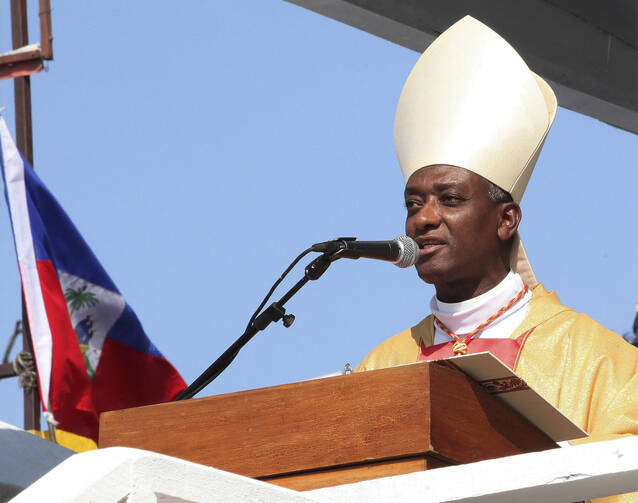The last time a Roman Catholic priest got involved in Haitian politics, things did not turn out so well.
That was the tragic saga of Haiti’s former President Jean-Bertrand Aristide, the erratic cleric who came to power twice, in 1991 and 2001, only to be ousted by coups and protests. The world is hoping Cardinal Chibly Langlois will turn out to be a better story. And so far, so good.
Langlois (pronounced “Long-lwah”) has no interest in being president, but if Haiti holds successful parliamentary elections in August, the cardinal could be credited with helping to get the Western Hemisphere’s poorest and most politically chaotic nation back on democratic track.
“We are at a crossroads,” Langlois said recently. “The country has been experiencing a long and delicate political phase.”
That’s a polite characterization of Haiti’s civic situation since an earthquake devastated the nation in 2010. In 2011, former carnival singer Michel Martelly was elected president. His own corrupt and authoritarian bent, coupled with the epic dysfunction of his opposition, has led to relentless gridlock and often violent street demonstrations.
The worst crisis involved Martelly’s apparent refusal to carry out elections for Haiti’s Senate and Chamber of Deputies, which should have been held shortly after he came to power. Cardinal Langlois stepped forward last year to break the stalemate, and his “inter-Haitian dialogues” did result in an agreement, the El Rancho accord, to hold the elections in the fall of 2014.
But El Rancho got derailed, largely because the opposition decided the new electoral law Martelly put forward was an unconstitutional ploy to give his party an edge. So Haiti’s Congress expired in January, and it has been dissolved ever since, leaving Martelly to rule by decree.
Still, the church dialogues laid just enough groundwork to compel Martelly, in March of this year, to set a date for the parliamentary elections—Aug. 9—and the presidential contest, scheduled for Oct. 25. (Martelly by law may not run for re-election.)
But as the August balloting approaches, it’s worth assessing how Langlois has performed in his first, and probably not his last, outing as Haiti’s go-to social mediator. The broader question is: Is he proving equal to the heavy cachet Pope Francis thrust on him in January 2014, when he tapped the relatively young (then 55) bishop to be the first cardinal in Haiti’s history?
Langlois—a prelate not from the capital, Port-au-Prince, but from the comparatively small diocese of Les Cayes—certainly brings a welcome humility to the role. He grew up poor near the port town of Jacmel, and his common touch helped raise his profile as Haitians struggled to survive after the 2010 quake.
But while the new cardinal may be a sorely needed calming influence in Haiti, analysts say that might also be a liability—that Langlois may be too soft-spoken to referee effectively the Haitian rough-and-tumble ahead and that seeing El Rancho through to its original schedule, for example, required a firmer episcopal hand than he gave it.
Either way, church leaders inside Haitian-American communities like Miami’s say Langlois prefers to lead by example. That’s evidenced, they add, by his unprecedented outreach to the Haitian diaspora.
The consensus in most diplomatic circles is that Haiti won’t see real rebuilding until it lets the country’s expatriates play a more active role. Toward that end, after his appointment as cardinal last year, Langlois visited the Haitian enclaves in a number of U.S. cities, including Miami.
But Langlois’s most pressing issue abroad is the humanitarian crisis next door in the Dominican Republic. The government there is poised to deport hundreds of thousands of Haitian-Dominicans under a controversial new immigration law that strips them of their Dominican citizenship—a measure Langlois recently called “inhumane.”
Back home, Langlois is also dealing with a rash of bandit assaults on church property—including robberies and attacks against nuns, some of whom were raped. The cardinal has called for an improved rule of law.
But that requires renewed political order—which may very well require the further mediation of Haiti’s first cardinal.








